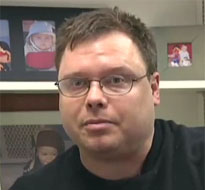Eric Ferkenhoff is an assistant professor at the Medill School, Northwestern University, where he advises and teaches classes ranging from enterprise to projects reporting.
He’s spent most of his career in Chicago, working for wires, newspapers and magazines, from the Chicago Tribune and Time magazine to the Boston Globe and the New York Times. As part of our “Research chat” series, Journalist’s Resource recently spoke with him about his teaching practices.
____
Journalist’s Resource: What does the structure of your classes look like, and how does that help emphasize depth in subject matter and research?
Eric Ferkenhoff: I just wrapped up a class on enterprise reporting, and it’s sort of a projects class, with many, many deadlines through the quarter. Students start with an umbrella topic, and do a series of stories that all build on each other so that you’re chipping away at a final project and are ready when you reach that final point. It’s like a mini-beat over a very short period of time. Over that time, I drill into them the question of “What is the ‘so what’ and ‘why now’ of this story?” I want them to push the conversation forward on an important issue — whether that’s education or budgetary issues or poverty or the economy. I want them to think about how they have entered the debate — not as an advocate, but entered the debate in terms of new information and data. I don’t think you can do that without having a very broad perspective, looking everywhere for information.
JR: What are your basic research rules for students?
Eric Ferkenhoff: Number one out of the gates is: If you think you have a story, first do a Lexis-Nexis, Factiva and Google News search. Make it a habit. Every story has been done, but it’s about finding the new angle or perspective. I then ask students to look through Google Scholar, Journalist’s Resource — scholarly sources and other databases — to see if their angle is truly new. And if it’s not new, I emphasize that, although it doesn’t kill story, they must then look for paragraphs and passages in articles and studies that hint at some other aspect of the issue that needs to be explored further.
JR: You mentioned Journalist’s Resource earlier. How do you use it?
Eric Ferkenhoff: It’s been a very timely resource for me. I’ve been working on some projects relating to poverty that are using Census-type data, as well as juvenile justice and education information. It just seems that every time that I’m working on a project, you folks will come out with a compilation of studies and an analysis of studies that are right up the alley of work that I’m doing and teaching. It’s almost freaky how timely it is. I’ll be looking for a particular type of research for my students, and I’ll get the Journalist’s Resource email. And I’ll say, “Well, that was easy!” You cover a wide range and an important range of issues. The classes that I teach draw on a lot of different aspects of government policy. These studies help us immensely in terms of background research and pointing us in the direction of data. I forward the entire email or I’ll take the individual URL and send my class to the site for the studies.
One thing it does is show young students the range of other experts out there. When my students at Medill are doing stories, they often call a Northwestern expert. But of course they don’t have to, necessarily. There’s a whole huge world out there, with a lot of perspectives on the great issues of our time, and Journalist’s Resource helps highlight that.
See Eric Ferkenhoff discuss the journalism school experience
http://youtu.be/jUv3oXGuMUQ
Tags: research chat


Expert Commentary